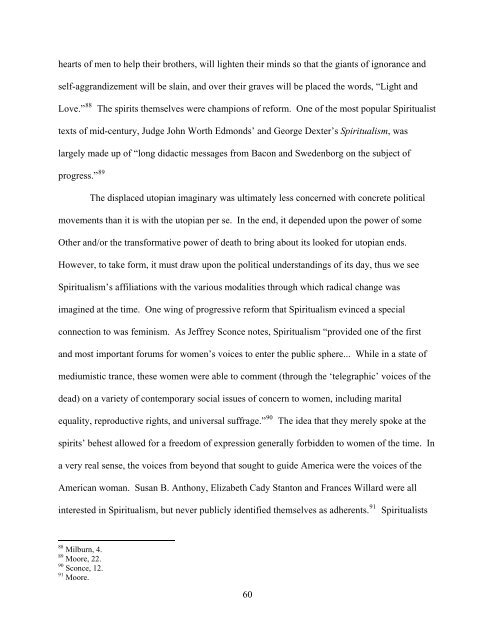A Genealogy of the Extraterrestrial in American Culture
A Genealogy of the Extraterrestrial in American Culture
A Genealogy of the Extraterrestrial in American Culture
You also want an ePaper? Increase the reach of your titles
YUMPU automatically turns print PDFs into web optimized ePapers that Google loves.
hearts <strong>of</strong> men to help <strong>the</strong>ir bro<strong>the</strong>rs, will lighten <strong>the</strong>ir m<strong>in</strong>ds so that <strong>the</strong> giants <strong>of</strong> ignorance and<br />
self-aggrandizement will be sla<strong>in</strong>, and over <strong>the</strong>ir graves will be placed <strong>the</strong> words, “Light and<br />
Love.” 88<br />
The spirits <strong>the</strong>mselves were champions <strong>of</strong> reform. One <strong>of</strong> <strong>the</strong> most popular Spiritualist<br />
texts <strong>of</strong> mid-century, Judge John Worth Edmonds’ and George Dexter’s Spiritualism, was<br />
largely made up <strong>of</strong> “long didactic messages from Bacon and Swedenborg on <strong>the</strong> subject <strong>of</strong><br />
progress.” 89<br />
The displaced utopian imag<strong>in</strong>ary was ultimately less concerned with concrete political<br />
movements than it is with <strong>the</strong> utopian per se. In <strong>the</strong> end, it depended upon <strong>the</strong> power <strong>of</strong> some<br />
O<strong>the</strong>r and/or <strong>the</strong> transformative power <strong>of</strong> death to br<strong>in</strong>g about its looked for utopian ends.<br />
However, to take form, it must draw upon <strong>the</strong> political understand<strong>in</strong>gs <strong>of</strong> its day, thus we see<br />
Spiritualism’s affiliations with <strong>the</strong> various modalities through which radical change was<br />
imag<strong>in</strong>ed at <strong>the</strong> time. One w<strong>in</strong>g <strong>of</strong> progressive reform that Spiritualism ev<strong>in</strong>ced a special<br />
connection to was fem<strong>in</strong>ism. As Jeffrey Sconce notes, Spiritualism “provided one <strong>of</strong> <strong>the</strong> first<br />
and most important forums for women’s voices to enter <strong>the</strong> public sphere... While <strong>in</strong> a state <strong>of</strong><br />
mediumistic trance, <strong>the</strong>se women were able to comment (through <strong>the</strong> ‘telegraphic’ voices <strong>of</strong> <strong>the</strong><br />
dead) on a variety <strong>of</strong> contemporary social issues <strong>of</strong> concern to women, <strong>in</strong>clud<strong>in</strong>g marital<br />
equality, reproductive rights, and universal suffrage.” 90<br />
The idea that <strong>the</strong>y merely spoke at <strong>the</strong><br />
spirits’ behest allowed for a freedom <strong>of</strong> expression generally forbidden to women <strong>of</strong> <strong>the</strong> time. In<br />
a very real sense, <strong>the</strong> voices from beyond that sought to guide America were <strong>the</strong> voices <strong>of</strong> <strong>the</strong><br />
<strong>American</strong> woman. Susan B. Anthony, Elizabeth Cady Stanton and Frances Willard were all<br />
<strong>in</strong>terested <strong>in</strong> Spiritualism, but never publicly identified <strong>the</strong>mselves as adherents. 91<br />
Spiritualists<br />
88 Milburn, 4.<br />
89 Moore, 22.<br />
90 Sconce, 12.<br />
91 Moore.<br />
60















